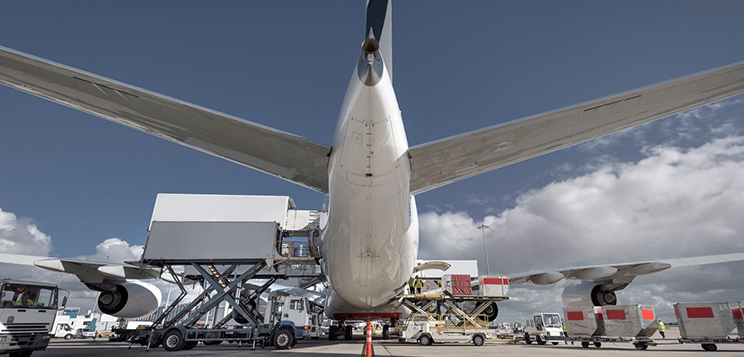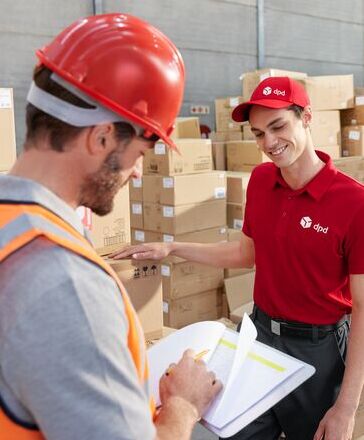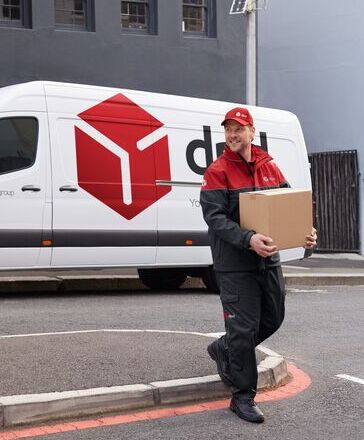

Export and customs information
Clearing customs without concerns.


Export and customs information
Clearing customs without concerns.
Shipping quickly and without complications to almost every country in the world – that’s our field. All goods that are exported have to be cleared and released through customs. We have collected all the important information for you. We also want to offer you the tools to make it easy for you to ship your international parcels.
Do you want to know more about exporting outside the European Customs Union?

Commercial invoice required by Customs
All goods sent to countries outside the European Custums Union go through customs. Depending on the destination, you therefore need to enclose a commercial invoice. If your product has no commercial value, then you state 'no commercial value' on the invoice.
Working method:
-
Draw up your invoice in English
-
Make three copies of the commercial invoice/proforma invoice: one for the exporting country; one for the importing country; one for the receiver
-
Add two of these copies in a packing list envelope and pack the envelope on the outside
-
Add a copy in the parcel itself
Only for the UK, no printed invoice is required on the outside of the parcel. Only if Customs asks for it, DPD's customer service will request this invoice from you.


EORI number
An EORI number is assigned to commercial importers and exporters by national customs authorities. Private individuals cannot apply for an EORI number. The EORI number is an identification number used in the processing of import declarations and Customs handling.How do you apply for an EORI number?
You can apply for an EORI number on the website of the Tax and Customs Administration. The number consists of a combination of existing figures. More information can be found at www.belastingdienst.nl. (Dutch only)


HS coding
Customs uses a commodity code or European HS code (Harmonised System) to classify products. This code consists of at least 8 digits for export. By using this code Customs knows:
-
Which products are in your shipment.
-
How much import duties and other import taxes may be levied on them.
-
Whether there are restrictions preventing a product from being exported.
Note: If the code is not filled in correctly, Customs may classify your products in a different product category. Your customer may have to pay a different price for this and you may be fined for incorrect classification. In the extreme case, DPD cannot make a Customs declaration.
To determine the commodity code of your product, you should take into account that many products cannot be found literally by their most common name. For example, a 'laptop' or a 'tablet' should be classified as a 'portable automatic data processing machine, weighing no more than 10 kg'.
Handy tool
The tax authorities have a handy tool to classify your products yourself. You can find it here.

DPD UK Import Prohibited list | 5,70 € | 5,90 € | 10,00 € |
HS code category | UK Tariff Description | Prohibited Reason | Comment/ Examples |
01 | Live animals | DPD UK's Terms & Conditions / Animal Health Certificate | Live or Dead Animals |
02 | Meat and Offal | DPD UK's Terms & Conditions / Animal Health Certificate | Live or Dead Animals |
03 | Fish and Crustaceans | DPD UK's Terms & Conditions / Animal Health Certificate | Live or Dead Animals |
04 | Dairy produce, eggs, natural honey etc | DPD UK's Terms & Conditions / Animal Health Certificate | Perishable items |
05 | Other products of animal origin | DPD UK's Terms & Conditions / Animal Health Certificate | Live or Dead Animals |
06 | Live Trees | DPD UK's Terms & Conditions / Phytosanitary Certificate (import)
| Perishable items |
07 | Edible vegetables and certain roots and tubers | DPD UK's Terms & Conditions / Phytosanitary Certificate (import)
| Perishable items |
08 | Edible fruit and nuts | Phytosanitary Certificate (import) | Rice, Wheat, Grain etc |
10 | Cereals | DPD UK's Terms & Conditions / Phytosanitary Certificate (import)
| Rice, Wheat, Grain etc |
| 13 | Gums and Resins | DPD UK's Terms & Conditions | Controlled Drugs i.e Opium |
15 | Animal or vegetable fats and oils | DPD UK's Terms & Conditions | Perishable items |
16 | Preparations of Meat/Fish | DPD UK's Terms & Conditions | Perishable items |
22 | Beverages, spirits and vinegar | DPD UK's Terms & Conditions / Excise Goods | Alcohol |
23 | Residues and waste from the food industries | Animal Health Certificate | Pet food prepared animal fodder |
24 | Tobacco and tobacco substitutes | DPD UK's Terms & Conditions / Excise Goods | Tobacco, loose leaf tobacco products |
27 | Mineral Fuels, oils and waxes | DPD UK's Terms & Conditions / Excise Goods | Dangerous/Hazardous Goods |
28 | Inorganic Chemicals | DPD UK's Terms & Conditions / Excise Goods | Dangerous/Hazardous Goods |
2901 - 2939 | Organic Chemicals | DPD UK's Terms & Conditions | Dangerous/Hazardous Goods |
30 | Pharmaceutical products | DPD UK's Terms & Conditions | Pharmaceutical products |
31 | Fertilisers | DPD UK's Terms & Conditions | Dangerous/Hazardous Goods |
36 | Explosives | DPD UK's Terms & Conditions | Firearms, Ammunition, Explosives |
3808, 3811 | Pesticides | DPD UK's Terms & Conditions | Dangerous/Hazardous Goods |
4301-4303 | Furskins and artificial fur | Animal Health Certificate | Raw hides & skins |
5302 | True hemp | DPD UK's Terms & Conditions | True hemp, cannabis |
6807 - 6808, 6811, 6812, 6815200000 | Articles of stone, plaster, cement, asbestos, mica or similar materials | DPD UK's Terms & Conditions | Dangerous/Hazardous Goods |
7101, 7102 | Pearls and diamonds | DPD UK's Terms & Conditions | Jewellery, Precious Metals and Stones |
85437070 | Electrical equipment and parts thereof | DPD UK's Terms & Conditions | Live or Dead E-Cigarette Products |
8601-8606, 8608-8609 | Railway or tramway locomotives | DPD UK's Terms & Conditions | Dangerous/Hazardous Goods |
8802, 8805 | Aircraft,spacecraft, and parts thereof | DPD UK's Terms & Conditions | Dangerous/Hazardous Goods |
| 93 | Arms and ammunition | DPD UK's Terms & Conditions | Firearms, Ammunition, Explosives |
| 9705, 9706 05 | Collections and collector's pieces | DPD UK's Terms & Conditions / Animal Health Certificate | Fine art, antiques etc |
98 | Complete Industrial Plant | Free circulation restrictions | Industrial Plant |
HS code category
01
HS code category
02
HS code category
03
HS code category
04
HS code category
05
HS code category
06
HS code category
07
HS code category
08
HS code category
10
HS code category
HS code category
15
HS code category
16
HS code category
22
HS code category
23
HS code category
24
HS code category
27
HS code category
28
HS code category
2901 - 2939
HS code category
30
HS code category
31
HS code category
36
HS code category
3808, 3811
HS code category
4301-4303
HS code category
5302
HS code category
6807 - 6808, 6811, 6812, 6815200000
HS code category
7101, 7102
HS code category
85437070
HS code category
8601-8606, 8608-8609
HS code category
8802, 8805
HS code category
HS code category
HS code category
98
| 5,70 € | UK Tariff Description | Live animals | Meat and Offal | Fish and Crustaceans | Dairy produce, eggs, natural honey etc | Other products of animal origin | Live Trees | Edible vegetables and certain roots and tubers | Edible fruit and nuts | Cereals | Gums and Resins | Animal or vegetable fats and oils | Preparations of Meat/Fish | Beverages, spirits and vinegar | Residues and waste from the food industries | Tobacco and tobacco substitutes | Mineral Fuels, oils and waxes | Inorganic Chemicals | Organic Chemicals | Pharmaceutical products | Fertilisers | Explosives | Pesticides | Furskins and artificial fur | True hemp | Articles of stone, plaster, cement, asbestos, mica or similar materials | Pearls and diamonds | Electrical equipment and parts thereof | Railway or tramway locomotives | Aircraft,spacecraft, and parts thereof | Arms and ammunition | Collections and collector's pieces | Complete Industrial Plant |
| 5,90 € | Prohibited Reason | DPD UK's Terms & Conditions / Animal Health Certificate | DPD UK's Terms & Conditions / Animal Health Certificate | DPD UK's Terms & Conditions / Animal Health Certificate | DPD UK's Terms & Conditions / Animal Health Certificate | DPD UK's Terms & Conditions / Animal Health Certificate | DPD UK's Terms & Conditions / Phytosanitary Certificate (import)
| DPD UK's Terms & Conditions / Phytosanitary Certificate (import)
| Phytosanitary Certificate (import) | DPD UK's Terms & Conditions / Phytosanitary Certificate (import)
| DPD UK's Terms & Conditions | DPD UK's Terms & Conditions | DPD UK's Terms & Conditions | DPD UK's Terms & Conditions / Excise Goods | Animal Health Certificate | DPD UK's Terms & Conditions / Excise Goods | DPD UK's Terms & Conditions / Excise Goods | DPD UK's Terms & Conditions / Excise Goods | DPD UK's Terms & Conditions | DPD UK's Terms & Conditions | DPD UK's Terms & Conditions | DPD UK's Terms & Conditions | DPD UK's Terms & Conditions | Animal Health Certificate | DPD UK's Terms & Conditions | DPD UK's Terms & Conditions | DPD UK's Terms & Conditions | DPD UK's Terms & Conditions | DPD UK's Terms & Conditions | DPD UK's Terms & Conditions | DPD UK's Terms & Conditions | DPD UK's Terms & Conditions / Animal Health Certificate | Free circulation restrictions |
10,00 € | Comment/ Examples | Live or Dead Animals | Live or Dead Animals | Live or Dead Animals | Perishable items | Live or Dead Animals | Perishable items | Perishable items | Rice, Wheat, Grain etc | Rice, Wheat, Grain etc | Controlled Drugs i.e Opium | Perishable items | Perishable items | Alcohol | Pet food prepared animal fodder | Tobacco, loose leaf tobacco products | Dangerous/Hazardous Goods | Dangerous/Hazardous Goods | Dangerous/Hazardous Goods | Pharmaceutical products | Dangerous/Hazardous Goods | Firearms, Ammunition, Explosives | Dangerous/Hazardous Goods | Raw hides & skins | True hemp, cannabis | Dangerous/Hazardous Goods | Jewellery, Precious Metals and Stones | Live or Dead E-Cigarette Products | Dangerous/Hazardous Goods | Dangerous/Hazardous Goods | Firearms, Ammunition, Explosives | Fine art, antiques etc | Industrial Plant |

Delivery conditions
Delivery conditions reflect the agreed arrangements between the consignee (importer) and shipper (exporter). The delivery conditions describe the responsibilities around transport costs, risk of damage and loss during transport between the parties involved. DPD, as the carrier, is not a party to that agreement. The INCO terms used may differ per country:
- DAP cleared (Delivered at place) The exporter arranges and pays for transport and handling costs to the agreed destination. The taxes & import duties are for the importer. “DAP cleared” is derived from “DAP”. The difference is that the handling costs are charged to the sender instead of the importer.
- DDP (Delivered Duty paid) The exporter arranges and pays for transport, handling costs & import duties to the agreed destination. The importer pays the taxes.
- DDP (Delivered Duty Paid / DAP DP). The exporter arranges and pays for transport, handling costs, import duties and taxes to the agreed destination.
- Ex works (EXW) Buyer is responsible for arranging transportation and all costs from cargo availability at seller until delivery (transport, taxes, handling costs & import duties).
- DAP (Delivered at Place / DAP NP) The exporter arranges and pays for transport to the agreed place of destination. The importer pays the handling costs, import duties and taxes.


Register with HMRC
The United Kingdom has legislation which makes it compulsory for the sender to always pay Value Added Tax (VAT) on parcels ≤£135. This tax is collected by HMRC (Her Majesty's Revenue Custom).
Do you send products with a value of less than £135?
-
Then register on the HMRC website in the UK.
-
After registration you will get a number which you can fill in in all technical solutions of DPD, also when you use the Online Shipping Service. More information about this regulation can be found here.
-
You can register here.

Export to:
| United Kingdom (UK) | Switzerland (CH) | Norway (NO) |
| Possibilities: | |||
Documents | No | Yes | Yes |
Incoterm | DDP (Delivered Duty Paid / DAP DP). DAP (Delivered at Place / DAP NP) | DAP cleared (Delivered at place) DDP (Delivered Duty paid) DDP (Delivered Duty Paid / DAP DP). Ex works (EXW) DAP (Delivered at Place / DAP NP) | DAP cleared (Delivered at place) DDP (Delivered Duty paid) DDP (Delivered Duty Paid / DAP DP). Ex works (EXW) DAP (Delivered at Place / DAP NP) |
Printed invoice | No | Yes | Yes |
Multi parcels in shipment | No | Yes | Yes |
Possibilities:
Documents
Possibilities:
Incoterm
Possibilities:
Printed invoice
Possibilities:
Multi parcels in shipment
United Kingdom (UK) | No | DDP (Delivered Duty Paid / DAP DP). DAP (Delivered at Place / DAP NP) | No | No | |
Switzerland (CH) | Yes | DAP cleared (Delivered at place) DDP (Delivered Duty paid) DDP (Delivered Duty Paid / DAP DP). Ex works (EXW) DAP (Delivered at Place / DAP NP) | Yes | Yes | |
Norway (NO) | Yes | DAP cleared (Delivered at place) DDP (Delivered Duty paid) DDP (Delivered Duty Paid / DAP DP). Ex works (EXW) DAP (Delivered at Place / DAP NP) | Yes | Yes |
Export and customs information
Shipments going outside the EU will involve customs formalities. You also have to add specific documents to your parcel. Which documents depends on the customs requirements of the country to which you are exporting, the type of product you are shipping and the value of the product.
Could you use a little help with the customs formalities? DPD is happy to help you to ease the customs process.
Export and customs information


Shipments going outside the EU will involve customs formalities. You also have to add specific documents to your parcel. Which documents depends on the customs requirements of the country to which you are exporting, the type of product you are shipping and the value of the product.
Could you use a little help with the customs formalities? DPD is happy to help you to ease the customs process.

Exporting outside the European Customs Union
If you have shipments to a country outside the European Customs Union, you need to comply with specific customs requirements. Keep the following in mind:
Checklist:
-
As a company, do you already have an EORI number for export?
-
Are you allowed to export your products?
-
Do your products have correct HS codes?
-
Are you aware of what delivery conditions (INCO terms) are in place for the destination country?
-
Every shipment consists of at least 1 package. Bulk is only possible after approval DPD. (Note: for export to the UK, a maximum of 1 parcel per shipment is possible).
-
Always supply 100% complete data. If the data is incorrect, the parcel will be returned.

Letting DPD complete the export declaration
If you would like DPD to take care of your export declaration, then you must issue a power of attorney (POA) to act as direct representative. This power of attorney/authorisation lets us take care of the customs clearance. You do, however, remain responsible for the content of the export declaration. DPD does not accept this responsibility.
You can download the authorisation. Once you have completed it, you can send it to [email protected]
Have you already authorised DPD? Then you do not have to issue a new authorisation.
Letting DPD complete the export declaration


If you would like DPD to take care of your export declaration, then you must issue a power of attorney (POA) to act as direct representative. This power of attorney/authorisation lets us take care of the customs clearance. You do, however, remain responsible for the content of the export declaration. DPD does not accept this responsibility.
You can download the authorisation. Once you have completed it, you can send it to [email protected]
Have you already authorised DPD? Then you do not have to issue a new authorisation.

